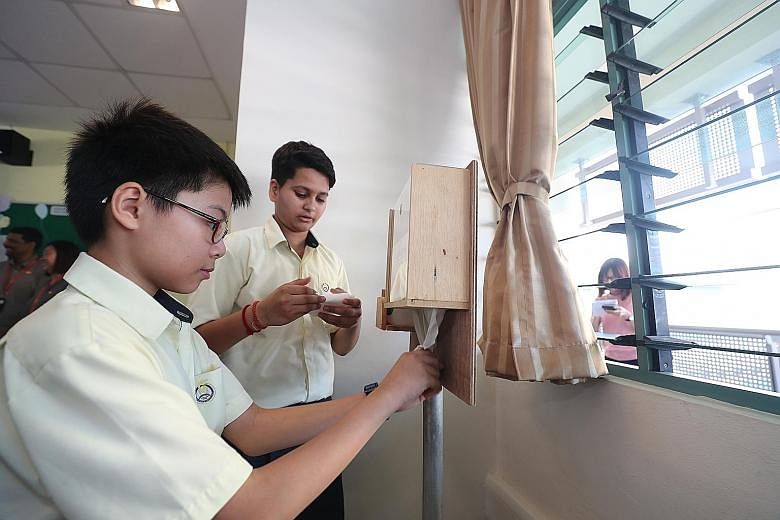Keeping yourself and your surroundings clean is no longer a matter of preference or being gracious, but the first line of defence against Covid-19, a panel of experts told The Straits Times yesterday.
In a discussion highlighting the importance of hygiene during this critical period, SG Clean Taskforce leader Masagos Zulkifli stressed that other measures such as border controls and quarantine would not be as effective in combating the outbreak if personal hygiene was neglected.
Mr Masagos, who is Minister for the Environment and Water Resources, noted that in the past two decades, the severe acute respiratory syndrome (Sars), Middle East respiratory syndrome (Mers) and H1N1 outbreaks were contagious or dangerous. The current Covid-19 pandemic, however, is both contagious and dangerous. "Therefore, we do need to think deeply for ourselves and also for society - what we want and how we are going to ensure that what we do will build these defences for the future.
"Public and personal hygiene is Singapore's first defence, not just against Covid-19 today, but against other (outbreaks) that we cannot foresee in the future," he added.
The new task force was launched earlier this month to raise cleanliness and public hygiene levels, and to change people's habits to stop the spread of disease.
Mr Masagos was one of four panellists who joined The Straits Times' science and environment correspondent Audrey Tan in an hour-long discussion around the theme of "Keep clean, to keep well", which was aired as a special episode of ST's talk show, The Big Story.
The other experts were Mr Tai Ji Choong, director of the National Environment Agency's (NEA) Department of Public Cleanliness; Mr Edward D'Silva, chairman of the Public Hygiene Council; and Professor Wang Linfa, director of the emerging infectious diseases programme at Duke-NUS Medical School.
Prof Wang explained why frequent hand-washing is an effective tool in battling the virus.
The virus has a lipid membrane on the outer layer that keeps it intact, said Prof Wang, and many of the cleaning agents - such as soaps and hand sanitisers - can dissolve this lipid membrane.
"All of these (cleaning agents) will not only clean the environment in the sort of general sense. More specifically for this Covid-19, you can actually disrupt the virus and prevent the transmission."
Mr D'Silva said technology can help to plug a manpower gap in the pool of cleaners here, such as the recent one caused by the lockdown imposed by Malaysia earlier this month.
Mr Masagos pointed out that because of these new circumstances, there was also a need to establish new social norms in places such as hawker centres and places of worship - with some practices possibly here for good.
Besides personal hygiene and the need to adjust norms, Mr Tai also shared that NEA has been working to raise cleaning standards across the island. This includes examining how cleaning companies can boost cleaning efforts not just in places where a case has been detected, but also in areas with high human traffic.
In the discussion, Mr Masagos said that while Singaporeans are worried about Covid-19, they must not lose sight of the fight against an equally dangerous disease: dengue fever.
Since the start of this year, there have been more than 4,000 cases of dengue infections here, double that of the same period last year.
The panel also spoke about the rate of transmission of Covid-19 and its role in "flattening" the epidemic curve, or containing the outbreak.
How the curve will behave depends on how efficiently each country's government and each individual in a society can work together and bring down the rate of transmission, said Prof Wang.
The panel also touched on the best and worst hygiene habits of Singaporeans. Mr Masagos said that while most Singaporeans do not litter, they tend not to have good habits such as returning food trays and keeping the table clean for the next user.
"We are a First World country. But let's be honest (about) whether we are already a First World people where hygiene and cleanliness are concerned."
Importance of personal, environmental hygiene
What does clearing your tray have to do with fighting the coronavirus? And has the Covid-19 outbreak helped in fighting climate change? The Straits Times sat down with four experts - Minister for the Environment and Water Resources Masagos Zulkifli, the Public Hygiene Council's chairman Edward D'Silva, director of the National Environment Agency's (NEA) Department of Public Cleanliness Tai Ji Choong and director of the emerging infectious diseases programme at Duke-NUS Medical School Wang Linfa - to find out more.
Q: What does tray return have to do with my health?
Professor Wang: Infectious materials are living organisms that thrive on food. The longer you leave contaminants on the table, the higher the chances of someone coming into contact with them.
Q: What is one of the worst hygiene habits people here have?
Mr Masagos: Until recently, even myself, after I eat in a hawker centre, I will put my tissue paper inside (my bowl) and I think that is not littering, it is just keeping it away from the floor and so forth. But I am beginning to recognise that these are also what I call little biohazards that you leave on the table sometimes or even in your bowl.
Eat on a tray so that if the food falls out of your bowl, it falls on the tray, and then when you return the tray, the table is clean for the next person. At the same time, cleaners do not have to clean up after you.
Q: Is 'I cannot find a bin' a valid excuse for littering?
Mr Tai: Well, just counting the public bins that are owned by NEA, we already have over 11,000 bins - and these don't include town council bins.
Shopping malls have their own bins. MRT stations have their own bins. So, actually, Singapore has no shortage of bins. And the bins are actually within very easy reach.
So, there is really no reason for a person to say: "I cannot find a bin, so I just drop (my litter)."
Q: What changes are being made to Singapore's hawker centres to encourage cleaner practices?
Mr D'Silva: We realise that when customers finish their food, if you want them to clear their trays, the tray-return facility should be as close as possible to them so that they don't have to walk a long way.
These are just behavioural patterns. So, I think this is something which we can learn and we can improve on.
Cleaning operators will have to also upskill themselves, and we need to see how we can help them mechanise to some extent, and at the same time educate and promote awareness among their own cleaners... (Cleaners) can do a much better, efficient job if they are doing things other than just clearing your trays.
So, I think these are little things that we can tweak in the months ahead.
Q: How do cleaning agents and disinfectants help fight the virus?
Prof Wang: The virus has a lipid membrane outside, and for the virus to remain intact, it needs to maintain the lipid.
Many cleaning agents can dissolve this lipid, so that is why it is very important that we wash our hands either with soap or a sanitiser or 70 per cent ethanol.
All of these will not only clean the environment in the general sort of sense but, more specifically for Covid-19, you can actually disrupt the virus and then prevent its transmission.
Q: Can Covid-19 help lower global emissions and fight climate change?
Mr Masagos: Even if there is a positive impact on climate change, the cost to lives is huge, and I don't think we should be celebrating this.
We have set the world on this journey of reducing emissions and then getting ready to adapt.
We must do everything we can now in our personal habits to use as little energy as possible, reduce our waste, recycle our waste, put it into the circular economy. At the same time, we look to new opportunities and new solutions. Fossil fuel versus, say, hydrogen.
All these are very great ideas that we should not dismiss and stop talking about.
Timothy Goh













